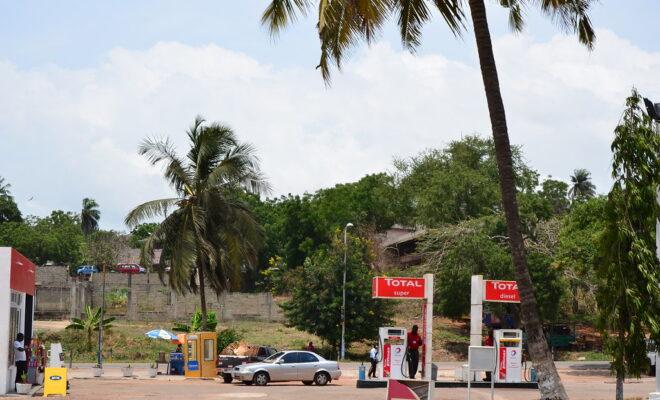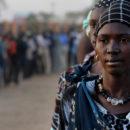Why what’s good for TotalEnergies is bad for the rest of us

The oil and gas major’s record-breaking profits will do little to comfort the people of the Global South.

A TotalEnergies (formerly Total) petrol station in Ghana. Credit: Ben Sutherland.
Last week, TotalEnergies published its 2021 financial results and 2022 outlook. Its announcement, revealing profits of over $18 billion last year, shows the largest profit in the history of any company in France. In short, Total is killing it. But the question is: at whose expense?
TotalEnergies (after rebranding last year) has a presence in 130 countries globally, including oil and gas extraction activities, refining and chemical sites, and service stations. Of these, 30 of their chapters are in Africa.
90% of the company’s investments go to oil and gas expansion with a view to increasing production by 50% by 2030, with a majority of these projects located within the Global South. If you were to pose the question “why?”, TotalEnergies would be quick to tell you their motivations are to support the Global South develop and catch up with the developed world. But who are we kidding? Companies, TotalEnergies included, are driven by profits, the planet be damned.
As the world rapidly divests from fossil fuels and as stricter regulations are imposed on these resources, especially in the developed world, it is not surprising that TotalEnergies and other Big Oil companies have identified the Global South as the key frontier for their polluting business under the guise of generating employment and revenue for these struggling economies and nations. Well, nothing could be further from the truth.
In a highly publicised revelation last year, it emerged that Total knew about climate change and its impacts for more than five decades and did nothing to solve the problems. In fact, all they have done is sponsor greenwashing campaigns and actions geared at misleading the public or hiding the impacts of climate change.
This would perhaps explain why many in Uganda and Tanzania do not see Total’s involvement and the announcement of the Final Investment Decision (FID) for the East African Crude Oil Pipeline (EACOP) and associated projects as a blessing, but as the beginning of an economic decline.
There are several reasons for this. To begin with, the structure of the agreement shows that Total has by far the most to gain. It holds a 62% stake in EACOP, eclipsing the 15% of shares owned by each of Uganda and Tanzania. Moreover, the EACOP Bill (now Act) is skewed to benefit the French company and has many gaps and weaknesses regarding environmental protection, community land rights, and climate change concerns.
EACOP is not the only African charm TotalEnergies has set its eyes on. In the Democratic Republic of Congo (DRC), Total had called dibs on a large portion of the pristine ecosystem that is the Virunga National Park. After years of dissent from climate and environmental activists, Total bowed to pressure and withdrew from the region. Whether this retreat was conditional remains to be seen.
Elsewhere, the company is currently planning to resume operations on a mega Liquified Natural Gas (LNG) project in Mozambique. This project was suspended for almost a year after its operations ignited flames of social tensions in Cabo Delgado, contributing to deadly conflict. When massive natural gas discoveries were made in Mozambique in 2009, the vision of leapfrogging to middle-income status was all too promising. More than a decade later, there is little to delight in. Instead, unfolding massacres, displacement, and untold misery have become the norm in the country’s gas-rich north. Vulnerable locals are feeling frustrated, caught up in a manifestation of the paradox of plenty. Their region is being plundered by political and global economic elites as they suffer violence and human rights abuses amid escalating insurgencies and security threats labelled as “terrorism”.
Beyond the irredeemable tragedy in Cabo Delgado, the town of Palma was also attacked, bringing chaos to the doorstep of Total’s operations and causing people to flee to neighbouring countries. As a result, TotalEnergies declared force majeure on its $20 billion project, absolving itself of its contractual obligations and commitments while maintaining the largest share of benefits as the project concessionaire. Most recently, Total announced its intent to restart the project, barely before a return to normalcy in the region.
The impacts of the fossil fuel industry in Africa goes beyond human rights violations and economic injustice. Their continued polluting activities will exacerbate the vulnerability of communities in Mozambique, Zimbabwe, Malawi and Madagascar that are yet to fully recover from the terrible cyclones that have left a wave of destruction and death. Evidently, the so-called developmental gains promised by such industries are nothing more than the brunt of an already devastating climate catastrophe as they continue to enrich themselves at the expense of African nations.
The people of Africa do not need to be weighed against profit and economic development. The climate crisis is already unfolding in the region. Solar, wind and other green alternative sources of energy that are in abundance have the potential to fuel the continent’s prosperity while putting its people, heritage and the environment at the centre of development.






